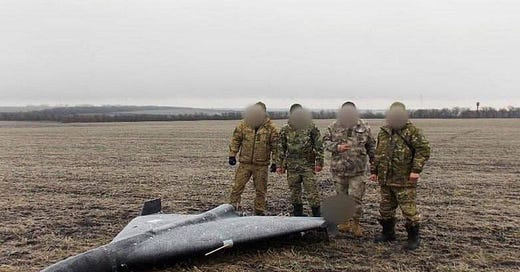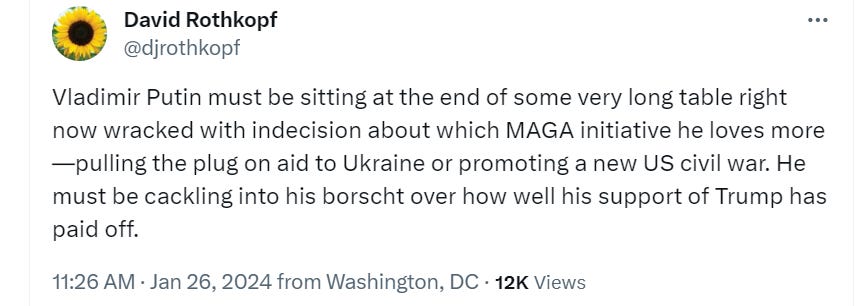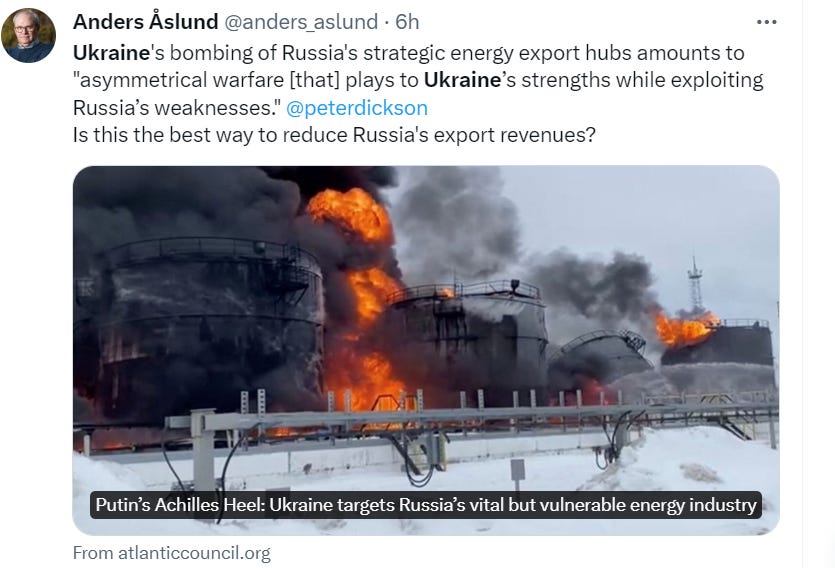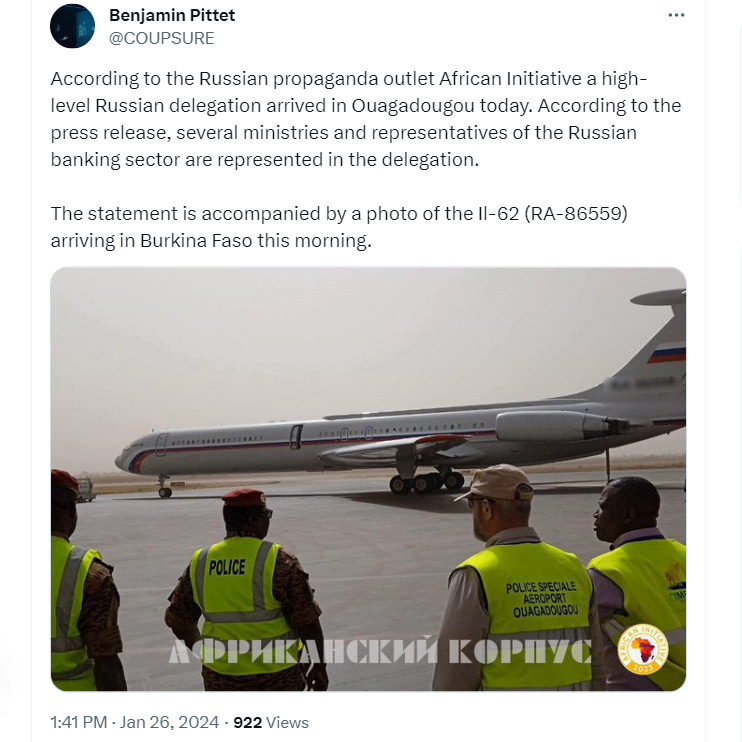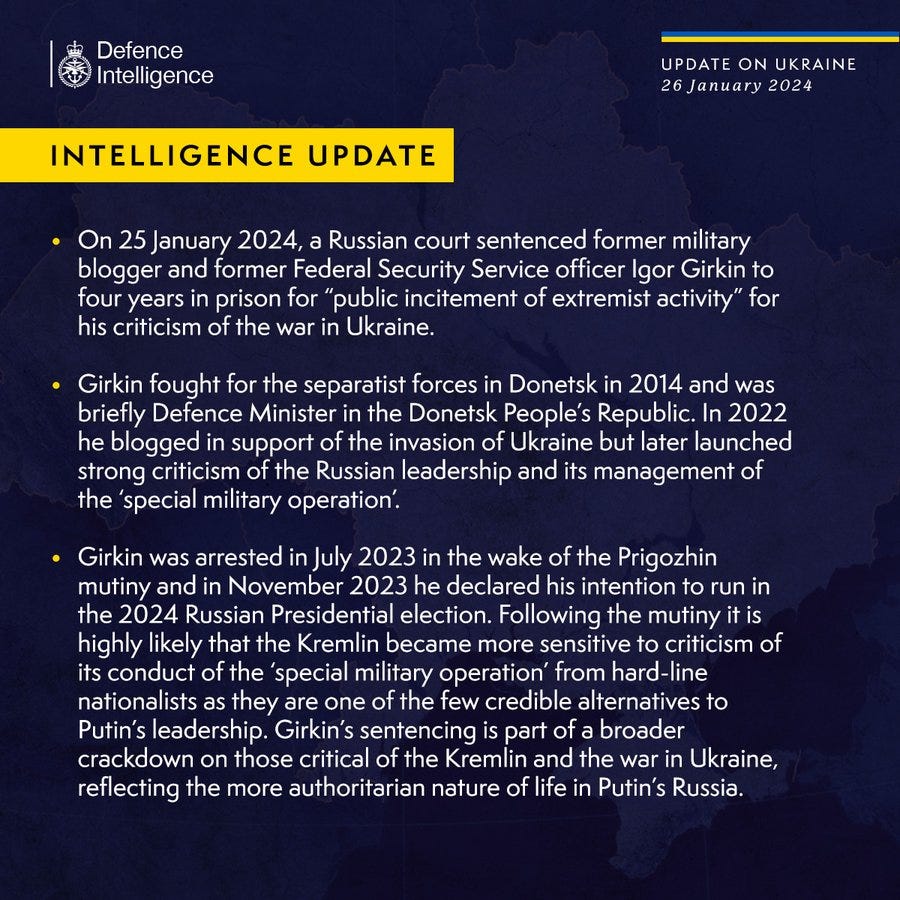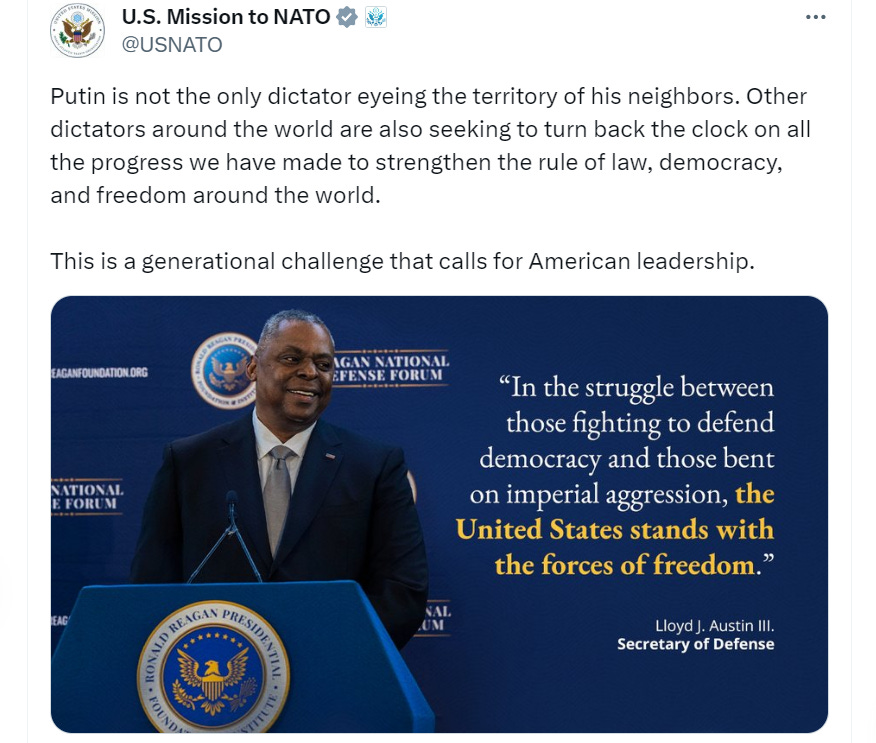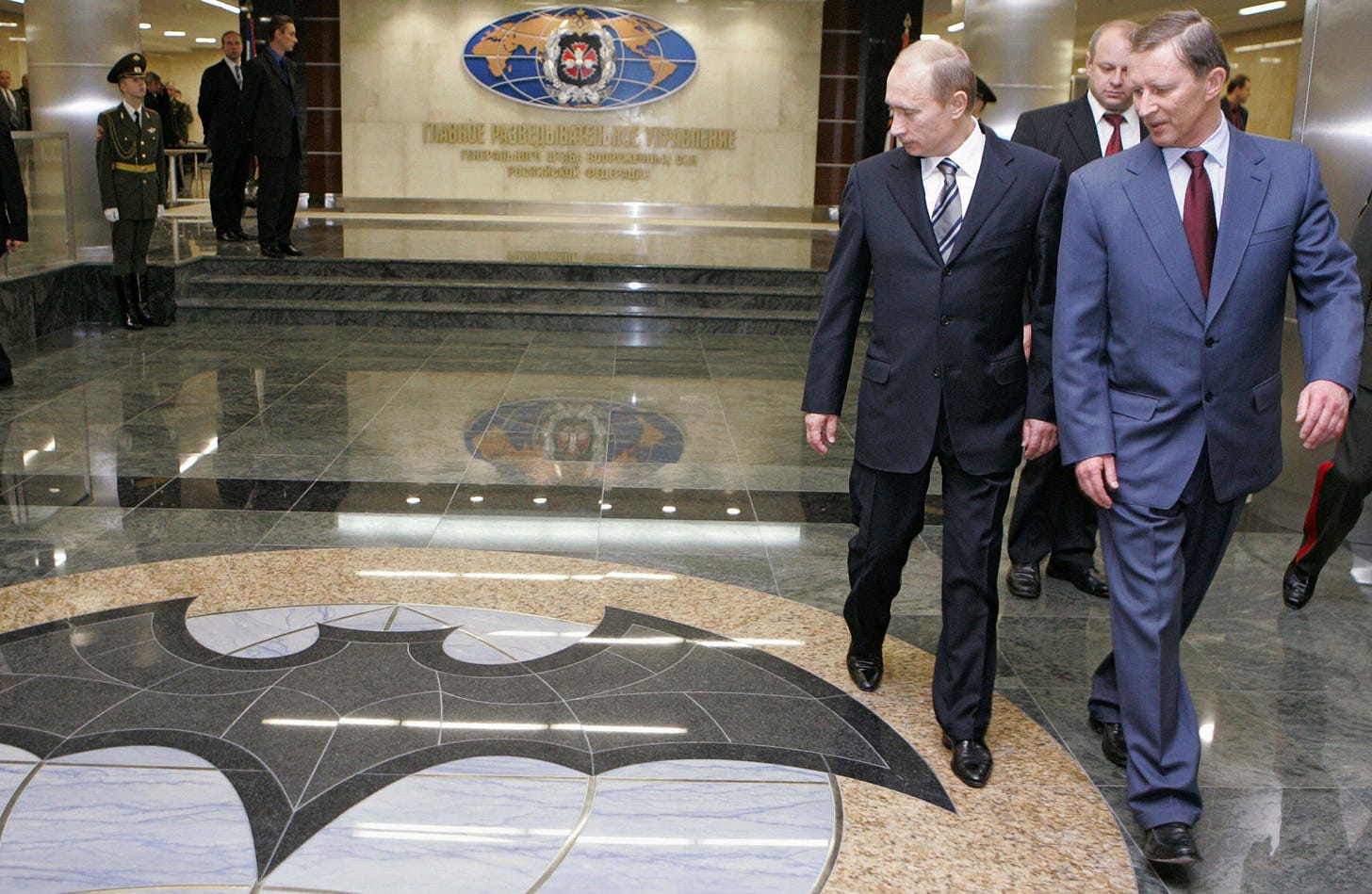Jan 27: E-Stories
Day702 Donetsk Kherson CombatSit BehindLines InRussia Allies 83.3MTrump A&P Rothkopf ISW UKDef Zelensky Noel UAWorld Browder Euroactiv Panyi Haydash Pittet Vayna Hamill FT Weiss Soldatov Gic Dickson
Catching up…
EA Worldview’s Ukraine Up-date- hop over to Scott’s amazing hourly Ukraine up-date page. I’ll fill in with some bits and bobs.
House Speaker Mike Johnson issues a warning that the emerging border deal is "dead on arrival" in the House if it aligns with leaked details. The statement emphasizes challenges in passing a national security package, including aid to Ukraine and Israel.
Stories we’re following…
Prosecutor’s Office: Russian shelling of Donetsk Oblast town kills woman. Russian troops shelled the town of Krasnohorivka in Donetsk Oblast on the afternoon of Jan. 26, killing a 60-year-old woman, the regional prosecutor’s office reported.
Overnight Jan 26, Russia fired two S-300 missiles at Kherson city. A 54-year-old woman was injured. She has a blast injury and wounds to her legs. There is damage to a kindergarten, a high-rise building and a shopping center building.
Russian attacks kill 3, injure 31 over past day. Russia carried out attacks against nine of Ukraine's oblasts over the past day, killing at least three people and injuring at least 31, local officials reported early on Jan. 25.
IAEA chief to visit Zaporizhzhia plant and Kyiv, Moscow to discuss nuclear safety. After his inspection of the Zaporizhzhia plant, IAEA Director Rafael Grossi said he would go to Russia, to engage in a political and technical dialogue with officials there.
Rosneft's Tuapse oil refinery halts production after a fire, reportedly due to a Ukrainian drone attack, the fourth on Russian energy infrastructure in a week. The fire impacted the export-oriented Tuapse refinery, according to district head Sergei Boiko.
President Zelensky’s evening address:
Today, I held a Staff meeting. The main focus was on the frontline situation. The reports were detailed, covering every direction, our defensive operations and active actions in general. Everyone in Ukraine knows where the intensity is currently the highest – Avdiivka, Maryinka, Kupyansk direction, southern directions – the highest attention to each…
Me: I’d like to highlight one aspect that often gets overlooked in Zelensky’s evening addresses and communications in general. Zelensky and his Ukrainian communications team are the best. They convey messages with warmth and strength, and keep their people and audiences abroad informed.
The Ukrainian Coordination Headquarters for the Treatment of Prisoners of War confirms that 65 Ukrainian defenders from a list published by Russian media were indeed scheduled to be returned to Ukraine as part of the planned exchange on January 24. Previously, some of the names on the list were said to be identified as POW's exchanged in early January. Chief of the Main Directorate of Intelligence, Kyrylo Budanov, once again emphasized that there is currently no reliable and comprehensive information on who might have been on board the plane.
Combat Situation Update
ISW: Russian forces appear to be preparing to fight their way through Avdiivka after failing to encircle the settlement. ISW’s assessment is in line with CDS.
The overall tempo of Russian offensive operations suggests that Russian forces have prioritized fighting through Avdiivka block-by-block from the town’s southern residential area instead of trying to further encircle the settlement from further southwest or to the north where Russian forces have made only limited gains.
Russian forces may seek to replicate attritional light infantry frontal assaults to make tactical gains by brute force, as Russian forces did during the Battle of Bakhmut after breaching Bakhmut’s city limits.
Ukrainian Ministry of Internal Affairs Major Maxim Morozov stated on January 25 that Russian forces have accumulated 40,000 personnel near Avdiivka and are preparing to intensify offensive operations against the city.
Ukraine’s hypothetical loss of Avdiivka would not threaten to unhinge Ukraine’s defense of Donetsk Oblast, even if Russian forces eventually manage to make costly tactical gains in the town over the coming months.
Increasing defence capabilities: A Ukrainian ground drone laying a barrier of TM-62 anti-tank mines. One of the reasons that the war has down considerably is that the Ukrainians and Russians have laid down formidable defence infrastructure to stop the advance of tanks and troops.
This is also why many analsyts and Ukrainian advisors were pushing for more offensive military armaments in the fall and winter 2022. They had advised the U.S. and NATO partners to take a less cautious approach to the supply of weapons so that the Ukrainians could advance before the Russians had set up their defences.
Explosions in occupied Skadovs'k, Kherson region are reported. Air defense is reportedly active.
UAWorld: The Russians launch the Shahed from the sea area to make them less visible to mobile air defense groups. "This tactic is not new, they have been applying it since the beginning when they tried to muffle the characteristic Shahed sound that can be heard from afar," reported Natalia Humeniuk, head of the Joint Press Center of the Southern Operational Command.
Noel Report: In a groundbreaking initiative, Ukraine's Project FURY aims to introduce advanced Western underwater drones, challenging Russia's dominance in the Black Sea. As USVs face increasing countermeasures, autonomous underwater vehicles (AUVs) offer surprise, stealth, and cost-effective reusability.
Project FURY collaborates with a Western AUV manufacturer, capitalizing on existing technology to enhance capabilities. AUVs, armed with stand-off weapons, present a strategic advantage, ensuring Ukraine's naval superiority and countering evolving threats. The initiative showcases Ukraine's commitment to innovation for continued success in the Black Sea.
A Ukrainian ground drone travels 4 km behind the frontlines in the Russian rear to blow up a key bridge for the Moscow hordes As filmed by a flying drone. Please watch it because it’s fantastic.
Behind the Lines
Ukraine has invited Chinese leader Xi Jinping to participate in the global peace summit in Switzerland, Deptuy head of the Presidential Office, Ihor Zhovkva reports. Until now, China always refrained from criticizing Russia for its invasion in Ukraine.
Euroativ: Germany has uncovered a major “pro-Russian disinformation campaign” using thousands of fake accounts on X to try and stir anger at Berlin’s support for Ukraine, a media report said on Friday.
Experts commissioned by the German foreign ministry used specialised software to monitor posts on the online platform X, formerly known as Twitter, between 20 December and 20 January, news weekly Der Spiegel wrote.
They reportedly stumbled across more than 50,000 fake user accounts that together pumped out more than a million German-language tweets.
A common theme was the accusation that Chancellor Olaf Scholz’s government was neglecting the country’s own population in favour of helping Ukraine in its war against Russia, according to Spiegel, which said it has seen excerpts of the analysis.
The accounts also often linked to fake news stories on websites designed to resemble those of genuine media outlets, Spiegel said, leading analysts to connect it to the Russia-linked “Doppelganger” campaign already known to authorities.
Three regional elections are taking place this year in eastern Germany, where the far-right AfD party is riding high in the polls.
EU foreign policy chief Josep Borrell warned this week that 2024 will be a”critical year” for fighting disinformation from actors such as Russia.
Slovakia: Mass demonstrations in Slovakia against the new Pro-Russian government. Demonstrations have been ongoing for over a week now and keep growing. The new Slovakian premier and governing party would like to bring Slovakia closer to Russia. There are probably domestic issues at stake as well.
Slovak Prime Minister Robert Fico, who is considered close to Hungarian Prime Minister Viktor Orban, said he would fight against any attempts to restrict Hungary's EU rights. Bratislava's opposition could prevent a unanimous decision on the move.
Meanwhile in Russia
There is no opposition in Russia: the real ones are behind bars well-hidden from the cameras and especially from the West. CNN should really do it’s homework instead of providing credence to the illusion that there are free elections in Russia or that the regime would allow someone to run against Putin.
The ‘candidate’ in question appears on Russian TV shows (as shown by Julia Davis) and he’s representing the ‘dissenting’ voice. These are well-choreographed shows, not spontaneous expressions of opinions.
Peskov says Russia has not changed its strategic aims: The Kremlin does not agree with Bloomberg's report on the alleged readiness of the Russian Federation to abandon demands on Ukraine about its non-joining NATO and neutral status. Kremlin spokesman Peskov said in a first response that the information is untrue. U.S. officials approached by Bloomberg said they are unaware of any news efforts on Putin's part, adding that such attempts are likely disingenuous.
Me: The contrasting statements coming out of Russia serves many purposes. The most important is to smear legacy media (mainstream media!), setting them up to fall for information which isn’t true. Another is to sow confusion in the West: “Putin wants peace and those pesky Americans won’t allow it” works well in an election year.
Bloomberg: Russia imported over $1 billion worth of advanced US and European chips in 2023. Despite sanctions, Russia imported advanced chips valued at more than $1 billion from U.S. and European companies during the initial nine months of 2023, according to classified data from the Russian customs service obtained by Bloomberg.
Allied Support
Jens Stoltenberg: “Allies in NATO and the European Union should step up and provide even more funding to Ukraine at this critical time," NATO Secretary General Stoltenberg said. He added that 'if Putin wins in Ukraine, there is a real risk that he will use force again.'
Scholz on security guarantees for Ukraine: 'I assume we will finalize it soon.' German Chancellor Olaf Scholz said that he expects Kyiv and Berlin to agree on security guarantees "soon" during the press conference on Jan. 24.
Bloomberg: Scholz, Biden to discuss Ukraine aid in Washington. German Chancellor Olaf Scholz will visit Washington in the first half of February for talks with U.S. President Joe Biden as the leaders aim to ensure continued Western assistance to Ukraine, Bloomberg reported on Jan. 26, citing unnamed sources.
Energy Security: The EU is reportedly preparing to reject the renewal of a crucial Ukraine gas pipeline deal with Russia set to expire this year. Despite countries, like Austria and Slovakia, heavily relying on Russian gas, the EU believes alternative supplies can be found.
Denmark opens new embassy office in Mykolaiv. Denmark has opened an embassy office in the southern Ukrainian city of Mykolaiv, Danish Foreign Minister Lars Lokke Rasmussen reported on Jan. 26.
"In addition to the embassy in Kyiv, we are now also permanently present in Mykolaiv, for which Denmark has taken a special responsibility in reconstruction," Rasmussen said.
If Hungary blocks the agreement on the €50 billion package for Ukraine, using Article 7 to strip Hungary of its voting rights has become a real option. Five European officials and diplomats said other countries are ready to make such a move.
EU begins screening of Ukrainian legislation in first step toward accession talks. The European Commission has started assessing Ukrainian legislation for compliance with EU laws, which "lays the groundwork for the (membership) negotiations," President Volodymyr Zelensky said on Jan. 25.
Sweden will not negotiate with Hungary over its bid to join NATO, which Budapest has yet to ratify, Swedish Prime Minister Ulf Kristersson made clear in a statement.
Danish Foreign Minister Lars Løkke Rasmussen arrived in Ukraine on a visit. He announced financial support to fight corruption in Ukraine worth $8.75 million as part of the EU anti-corruption program.
Deterrence: The US plans to station nuclear weapons in the UK amid rising Russia threats. Pentagon documents reveal new RAF Lakenheath facility for warheads, marking a significant shift since their removal in 2008.
The Jury in E. Jean Carroll’s defamation case has determined the following:
Emotional harm- $7.3M; Reputation damage- $11M; Punitive damages- $65M for a total of 83.3M.
The judge informed the jurors not to disclose their identities to the public. During the deliberations the jurors did not know eachother’s names. That tells you that they will be targeted by either Trump, his team, or anyone of his MAGA followers.
E. Jean Carroll lawyer Shawn Crowley concluded her rebuttal by saying Trump believes "he gets to lie. He gets to threaten. He gets to ignore a jury verdict. He gets to defy the law and the rules of this courtroom," Crowley said.
"You saw how he behaved through this trial. Rules don't apply to Donald Trump." "Ladies and gentleman, this isn't a campaign rally. It's not a press event. It's a court of law and Miss Carroll's life. Donald Trump sexually assaulted her. He defamed her. He is not the victim."
FT: Ukraine war is ‘battle for ammunition’, says Nato chief
Russia’s war in Ukraine has turned into “a battle of ammunition”, Nato’s head has warned, as supply shortages have forced Kyiv’s military to ration artillery rounds.
“Increased production of ammunition is an absolute necessity to enable us to continue to provide support to Ukraine,” Nato secretary-general Jens Stoltenberg said on Tuesday, as the alliance signed a €1.1bn deal to procure more ammunition its members can use to arm Ukrainian forces or to replenish their own stocks.
“With the consumption of ammunition we see in Ukraine, with the needs we see . . . we need to ramp up production,” Stoltenberg added.
His comments came hours after Ukraine was hit by another Russian barrage, with officials in Kyiv growing increasingly concerned their forces could run out of munitions by the time allies in the US and EU finally agree on further military assistance for this year.
Faced with dwindling supplies, Ukrainian soldiers on the front line have told the Financial Times in recent days that they are forced to ration munitions while Russian troops step up their attacks.
“Indeed there is really not enough ammunition,” said a senior Ukrainian artillery brigade officer. Ukraine went from firing 8,000 shells per day during its counteroffensive in the summer to just 2,000 in recent weeks, according to a platoon commander.
Oleksandr Tarnavskyi, Ukraine’s commander of operations in the south-east, told reporters in December that his forces faced a shortage of artillery shells due to the lack of western military assistance, forcing troops to scale back some operations along the 1,000km front line. [continue]
Michael Weiss: New interview with "Karl," the Estonian military analyst whose insights on the war in Ukraine have proved remarkably acute. With @holger_r:
"Let’s start from the frontlines where changes over the last months have been completely minimal. Russia has slight success south of Kupyansk and allegedly also south of Avdiivka, but it is only on a very operational level."
"While Ukraine didn’t achieve much during their 3-month offensive in the summer, Russia achieved even less now over the last 3 months. It’s a stalemate."
"Ukraine's problem is the increasing shortage of specific ammunition. It’s not yet totally dire but the limits are getting close."
"There is increasingly more information coming from different sections on the frontline that Russia’s superiority in artillery fire is getting critical."
"If the situation doesn’t improve, it will start affecting the frontline. No matter how much smarter you are or how much more accurate and efficient your weapons are, if the ratio is 10:1 for Russia, it will affect the frontline."
"Ukraine’s big achievement is that they have continuously weakened Russia's positions at and around the Black Sea. Hitting the A-50 and IL-22 planes impedes Russia's missile attacks coming from that direction."
"The intensity of Russia's missile attacks is clearly lower than it was last year. Then they had weekly attacks with more than 100 missiles, now the number of missiles is more around 40 and attacks are not weekly."
"In the beginning of winter last year Russia even carried out such large scale attacks twice a week."
"Ukraine's air defense is significantly better than a year ago. Last winter there were several regions which were without electricity for days. We don’t see this now. I think we can say that from the energy point of view, Ukraine will survive the winter."
"Ukraine doesn’t have the capability to shoot down S-300/S-400 and Kh-22 rockets. But their radius is small. Russia can target Kharkiv, Kherson, smaller towns in Sumy and maybe Zaporizhzhia with them."
"Those missiles were intended for air defense and anti-ship purposes but Russia is using them on land targets. Their accuracy is really off and that’s why Russia can’t hit military targets with them. They will miss. That is why we see random residential houses hit in Kharkiv."
"The percentage of shot-down cruise missiles is very high but with Iskanders it was at 50% yesterday. Ukraine has started to emphasize that they are using increasingly more REB (radio electronic combat) methods in air defense."
"Rockets are not being shot down but jammers lead them off the targets. If Ukraine can successfully use REB, it is good news because it saves air defense rockets and is also cheaper."
"The biggest problem continues to be the West’s inability to fund and equip Ukraine. The EU’s decision to fund Ukraine [with €50bn] will come next week one way or another. But there is no assurance whatsoever that the U.S. will approve its package."
"Reportedly the Senate will agree on aid this week but it doesn’t guarantee that House Republicans will tag along. The Senate has been quiet on this topic this week but that might not be so bad. Often a lot of noise is worse than quiet."
"The Biden administration doesn’t consider Ukraine an absolute priority problem. They’re playing their political games so that they could blame the GOP for blocking aid. The Republicans in turn can blame Dems for not taking the U.S southern border seriously enough."
"Because neither issue is a top priority for either side, there is no decision and political games continue. Then there’s also the U.S. "fear of escalation." All in all, the administration hasn’t set a goal of Ukraine beating Russia and chasing them out of their territory."
"Their maximum goal is that Russia doesn't win the war. It is a long-term strategic mistake which stems from the lack of courage in decision-making."
"The U.S aid package has been coming since October. Now we are really running out of time. Even when the decision is eventually made, there will be a gap in Ukraine's capabilities on the frontline because supplies take time to arrive."
"There will be very difficult weeks ahead. Ukraine will not lose the war in just a few weeks and Russia will not gain a massive advantage. But in a matter of a few months, the situation can become critically worse."
"Europe is getting better in this but in the short term Europe’s contributions will not be able to replace America's. There are also considerable problems getting Ukraine's own military industry up and running."
"Historically, Ukraine’s military industry has been located either on currently occupied areas or close to the frontlines."
"It’s unrealistic to do it there now. Restoring the industry anywhere on Ukraine’s territory requires a very high level of air defense capabilities. Otherwise it will be a pointless investment."
"If the West’s aid returns to the “Biden minimum” level, it is highly probable that the frontline will remain stable in the coming months. Some decisive factors will be who will be better at developing drone capabilities, REB etc."
Inside Russia’s Secret Propaganda Unit—Michael Weiss, Andrei Soldatov
Newly discovered documents reveal the role of a secret Russian intelligence section called Unit 54777 in propaganda and espionage operations
To understand Unit 54777’s remit, it’s first necessary to understand its provenance.
In the Soviet Union, psyops were conducted by the Special Propaganda Directorate, incorporated in the massive directorate of the army, GLAVPUR (Glavnoye Politicheskoye Upravlenie, or the Main Political Department). GLAVPUR was a powerful testimony to Bolsheviks’ constant fear of the army going rogue or mutinying. In 2019 the Russian army proudly celebrated the centenary of GLAVPUR, established by the Revolutionary Military Council of Bolsheviks a year and a half after the October Revolution as the political department to supervise thousands of commissars, Communists attached to military units to spy on and oversee their commanders (the commissars had the final word in military operational planning).
The Communists never fully trusted their soldiers since soldiers had played a decisive role in all attempted or successful seizures of state power in Russian history. It was the commissars who kept the Red Army loyal to the regime even during the first two disastrous years of war with Nazi Germany, when millions had been killed or captured, thanks to the incompetence of the officers’ corps, which had been hollowed by Stalin’s purges. (Hitler, inspired by Soviet experience, had his own commissars and version of GLAVPUR called the National Socialist Leadership Office, or NSFO, whose officers embedded with the Wehrmacht to kindle a fighting spirit at the late stage of World War II.)
After the war, ideological overseers in the Soviet military proliferated. By the late 1980s, there were 20,000 political departments with 80,000 “political workers” – the new designation for commissars – and all were supervised by the ubiquitous and all-powerful GLAVPUR. The Special Propaganda Directorate was part of that empire. Then, in the early 1970s, the Soviet military established special propaganda training facilities in the Military Institute of Foreign Languages, where Golyev studied, and for the faculty of Journalism at Moscow State University, the goals being to train officers in psyops and create a reserve of Soviet journalists in the event of war mobilization, respectively.
The fidelity of the Soviet army remained a primary objective of GLAVPUR. The Special Propaganda Directorate was, in theory, busy developing methods of subverting the hostile armies’ morale but was mostly focused on its own military personnel rather than on Western soldiers. It was the body that played a largely defensive, not offensive, role.
Unless, of course, actual war broke out again. “As for special propaganda,” Arsen Kasyuk, one of the top authorities on Soviet-era special propaganda, told official Russian Defense Ministry newspaper Krasnaya Zvezda in June 2011, “it is present wherever there is a conflict, where active hostilities begin. Prior to that, the special propaganda bodies are, so to speak, in a waiting-preparatory mode, they assess the situation, improve their methods, their technical base.”
Whether by accident or design, this exact doctrine was articulated in a slightly more excitable fashion by Margarita Simonyan, the editor-in-chief of RT, the Kremlin’s English-language propaganda channel. “Right now, we’re not fighting anyone,” Simonyan told the Russian newspaper Kommersant in a 2012 interview. “But in 2008 we were fighting. The Defense Ministry was fighting with Georgia, but we were conducting the information war, and what’s more, against the whole Western world. It’s impossible to start making a weapon only when the war [has] already started! That’s why the Defense Ministry isn’t fighting anyone at the moment, but it’s ready for defense. So are we.”
Programming notes…
A stellar panel to discuss what is necessary for Ukraine’s victory: pay attention to the statistics and assessments.

